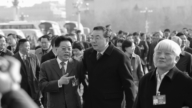【新唐人2013年11月14日讯】随着中共十八届三中全会闭幕,会议公告紧接着宣布,中共当局将重点关注七项改革决定,其中设立“国家安全委员会”,特别引发外界关注。有分析指出,中共党魁习近平通过设立“国家安全委员会”,将高层实权收回到自己手中,正式改变了前中共党魁江泽民为垂帘听政而设立的常委分权制,江派“第二权力中央”政法委,被彻底解体。
被外界称为如地下党般秘密召开的中共三中全会,12号终于闭幕了。会议公报摘要宣称,中共中央将成立“全面深化改革领导小组”,并设立“国家安全委员会”,完善国家安全体制和国家安全战略,确保国家安全。
有分析指出,中共成立“国家安全委员会”的目地,是因为中共党魁习近平非常需要一个国安幕僚机构,可以直接提供整合国防、外交、反恐、维稳等重大事务的能力与建议。
时事评论家横河:“原来政法委至少在名义上是党的系统,现在成立国家安全委员会,就想冒用国家的名义了,但是实际上因为是党的三中全会决定的,所以这个以国家名义出面的委员会,实际上还是党的委员会,因此与其说是它要保护国家的安全,还不如说它要保护中共的统治。”
另有分析指出,习、李变革在力保中共统治的前提下,与前党魁江泽民集团短兵相接,三中全会后,中共将进入全面公开厮杀的状态,中央和地方诸侯、江派和习近平阵营的冲突将日趋白日化。
时事评论员夏小强:“江泽民下台前,把最高层权力,分散到各个中共政治局常委的手中,以此来制约胡锦涛和温家宝,继续维持自己垂帘听政的角色,这次三中全会,习近平通过设立国家安全委员会,和中央全面深化改革领导小组,这两个高层权力机构,把高层实权收回到自己手中。正式改变了江泽民设置的常委分权制的高层权力结构,江派第二权力中央被解体。”
时事评论员夏小强指出,江泽民通过“政法委”控制中国的公安、法院、检察院、国安、武装警察系统,实际上是另一个“中央权力中心”。而为了迫害镇压法轮功成立的“610”秘密机构,也能随时调动中国外交、教育、司法、国务院、军队、卫生等资源。
1999年6月10号,江泽民在政法委的基础上,成立了一个专门处理法轮功问题的领导小组办公室,简称“610”(办公室),专门用于打压法轮功。
外界评论,这个法外授权的临时性组织“610”,如文革时期的“中央文革小组”。而“610”从根本上彻底逆转了前中共领导人胡耀邦、赵紫阳和乔石等在“文革后”对民主和法制的努力,也将中共的“法治”倒退为江泽民一人独裁的“人治”。
夏小强:“中共此次所组建的国安委,将负责情报、军队、外交、公安等任务,正在取代江派政法委的作用。因为从江泽民掌权时代起,政法委书记高调成为政治局常委,一直延续到习近平上台。”
夏小强指出,从中央到地方的政法委书记,一般都同时兼任当地“610”办公室负责人,这样一来,中央分管政法委的政治局常委的实权,比其他常委都重要。而江系为了避免因迫害法轮功遭到大清算,最大的举动就是紧抓“中央政法委书记”这个位置不放。
中共十八大前夕,江泽民以及紧跟江迫害法轮功的急先锋——前中共中央政法委书记周永康,计划将“第二权力中央”的继承人——前重庆市委书记薄熙来,推进中共最高权力层,并策划2014年通过政变,让薄熙来替代习近平。这一计划,被前重庆市公安局长王立军打破。王立军去年(2012年)年末,夜逃美领馆寻求美国政治庇护,虽以失败告终,却令薄熙来下台受审。
采访编辑/常春 后制/李勇
The State Security Committee Signals Dismissal of
Politics and Law Commission
The communiqué following the closing of the Third Plenary
Session discloses the major issues concerning
comprehensively deepening reforms.
Among them, the decision to set up a state security committee
has drawn much concern.
Some analysts say that Xi Jinping is retrieving the central
power through this state security committee.
It will officially dismiss the current status of
decentralization by the Jiang Zemin faction in the Politburo
standing committee, i.e., the Politics and Law Commission.
The Third Plenum, labeled as an underground party gathering,
concluded on the 12th.
The communiqué declares that the CPC will set up a central
leading team for “comprehensively deepening reform".
The country will establish a state security committee,
improving systems and strategies to ensure national security.
The purpose of the state security committee has been analyzed,
to enable Xi Jinping to establish his authority in direct
integration of defense, foreign affairs, anti-terrorism,
and stability maintenance.
Hen He, commentator: The Politics and Law Commission is
a nominal party system.
The state security committee is in the name of the country,
but it was decided upon, during the Third Plenum of
the Communist Party.
Therefore, the so-called state committees are
actually party committees.
Rather than defending the security of the nation
it is to defend the party’s ruling.
It was also analyzed, following the closing of the plenary,
while Xi and Li were insistent on adhering to the ruling of
the CCP, the conflict between the new leaders and
former leader, Jiang Zemin’s faction will step into an open
battlefield with both central and local powers involved.
Xia Xiaoqiang, Political commentator: Jiang Zemin
distributed central power to the standing committee of the
Politburo prior to his leaving office.
His role in the central committee was thus sustained through
controlling individual committees.
He was then able to restrict the authority of
Hu Jintao and Wen Jiabao.
In the Third Plenum, Xi Jinping retracts his authority through
the establishment of the state security committee and the
central leading team for “comprehensively deepening reform".
These decisions officially change the power decentralization
by the Politburo standing committee and
dismiss Jiang Zemin’s power center.
Political commentator Xia Xiaoqiang explains that
Jiang Zemin had manipulated the regime through his
central power, the Politics and Law Commission.
It has control over China’s public security, courts,
prosecutors, national security, and armed police system.
In particular, he established the “610 office", a security
agency to coordinate and execute the
persecution of Falun Gong.
This security agency’s power over-rides and is empowered
to mobilize other resources such as those in diplomacy,
education, justice, the State Council,
the military and health.
Upon Jiang Zemin’s order, the 610 Office was created
on 10th June, 1999.
It is the implementation arm of the Central Leading Group
on dealing with Falun Gong, headed by high-ranking members
of the Communist Party’s Politburo standing committee.
This temporary and non-judicially authorized organization
has been criticized to function similarly to the Cultural
Revolution Group during the Cultural Revolution.
The 610 office has completely reversed the efforts of former
communist leaders such as Hu Yaobang, Zhao Ziyang and
Qiao Shi in democracy movements and the rule of law after
the Cultural Revolution.
Jiang Zemin has turned the CCP regime into a complete
“rule of man" dictatorship.
Xia Xiaoqiang: This state security committee will replace
the Politics and Law Commission to oversee intelligence,
military, diplomacy, and public security.
Since Jiang Zemin’s era, the secretary of the Politics and Law
Commission has stepped up to become a Politburo
Standing Committee member.
Xia Xiaoqiang explains that the Secretary of the Politics and
Law Commission from the central to local government generally
serves as the head of the local 610 office.
Consequently, the Central Political and Law Commission
Secretary has overpowered the rest of the
Politburo standing committee.
Jiang Zemin’s faction, for fear of liquidation over the
persecution of Falun Gong, has to hold on to the power
and the position of the Secretary of the
Central Political and Law Commission.
Prior to the 18th National Congress, former Chongqing Party
Secretary Bo Xilai was the heir to Jiang Zemin’s central power,
the Central Political and Legal Committee.
The coup plan, organized by Jiang’s ally, Zhou Yongkang,
former Central Political and Legal Committee Secretary,
intended to have Bo replace Xi Jinping in 2014.
However, this plan was exposed through Wang Lijun’s
incident in 2012.
Bo Xilai was thus forced to step down and was put on trial.
Interview & Edit/ChangChun Post-production/LiYong



























